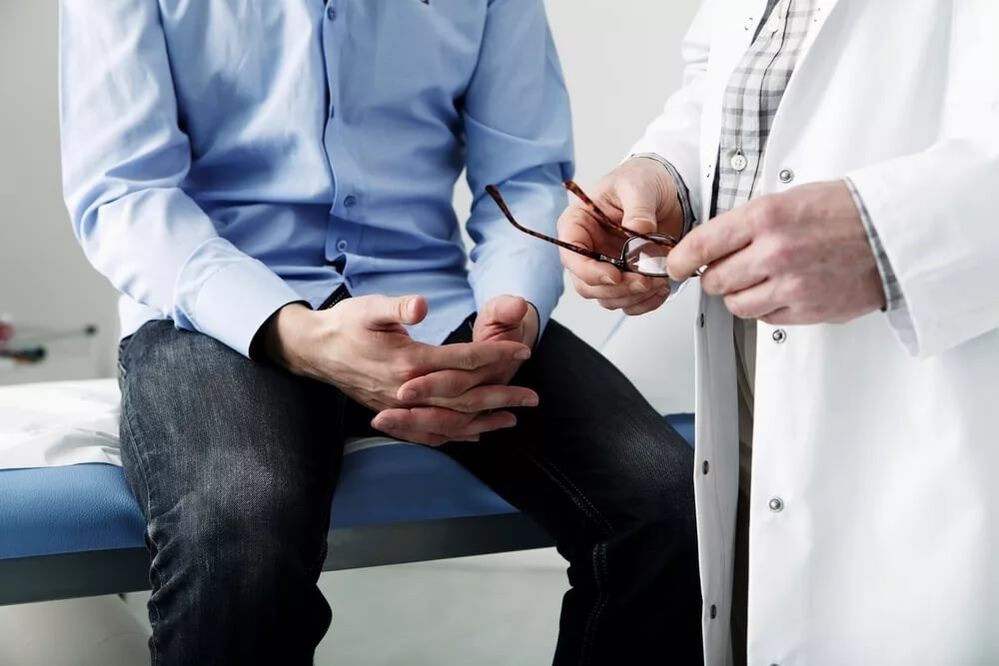
Prostatitis in men is an inflammatory lesion of the prostate gland that significantly impairs quality of life.
Causes of prostatitis
The following risk factors exist:
- genital tract infections;
- weakened immunity;
- bad habits;
- irregular sex life;
- hypothermia of the body;
- sedentary lifestyle.
These factors contribute to the intensification of the sluggish inflammatory processes of the prostate gland (prostatitis). It is easier to help a patient in the early stages of the inflammatory process than to wait for the clinical manifestation of the disease in the form of various urinary disorders, decreased quality of sex life, or reproductive difficulties.
Symptoms of prostatitis
In most patients, the lack of complaints in the early stages of the inflammatory process of the prostate (prostate) is due to the small number of pain receptors in the organ.
Of course, you should see a urologist if you are concerned about:
- painful feelings in the perineum, lower abdomen;
- itching in the urethra;
- the quality of sex life decreases;
- frequent urination (not always painful);
- you have to go to the toilet at night;
- sexual partner cannot get pregnant.
In addition, fever, weakness, and nervousness (including those caused by fears) are possible.
Treatment should not be delayed until the onset of symptoms (complaints) that may resolve for some time but progress without medical attention.
Comprehensive treatment of prostatitis
You should consult your doctor for effective treatment. Diagnosis is based on complaints, test data, and test results. A quality test guarantees the success of the diagnosis (by exploring the causes) and further treatment. The required test can be performed in a special clinic. If you already have the laboratory tests and ultrasound results in your hands, the doctors of the clinic recommend that you take your order with you. This can save your family budget and shorten your examination time.
In the complex therapy of prostatitis, the doctors of the clinic use modern, highly effective drugs, therapeutic procedures, training therapy, and nutritional recommendations. All this makes it possible to eliminate the causes and consequences of the disease. Which leads to restoring the patient’s health as quickly as possible.
Treatment of acute prostatitis
Treatment is based on antibiotic therapy, tailored to the individual patient, in a specific case. Anti-inflammatory and antipyretic agents are used as an adjunct. Excessive fluid intake and bed rest are recommended. If it is impossible to urinate, a catheter is placed to remove the urine. If an abscess develops, the patient undergoes a transurethral or transabdominal opening of the purulent focus.
In the severe stage of prostatitis, urgent hospital treatment is required.
Effective treatment of chronic prostatitis
The complex effect on the prostate gives good results:
- Antibacterial, antiviral, antifungal therapy is selected individually based on the results of laboratory tests and the stage of the disease.
- Anti-inflammatory therapy.
- Preparations that restore weakened immunity.
- Prostate massage restores the structure and function of the organ, improves the supply of medicinal substances.
- Gymnastics increases the effectiveness of the previous three points.
- Nutrition recommendations.
Prevention of prostatitis
Primary prevention involves the prevention of a disease in a healthy person.
- Fighting the sedentary lifestyle. Including training therapy.
- The most complete nutrition with the mandatory use of complexes of vitamins and minerals (trace elements).
- If you do not have a permanent sexual partner, it is mandatory to use a condom during sexual activity. And rejection of oral sex (the same microbes live in the mouth as in the urogenital system).
- If you have a regular sexual partner when infections of the urogenital system occur (this can be a complication after a cold, food poisoning, and lack of hygiene), synchronous treatment with the same medications is mandatory on a daily basis.
- If you and your partner have anal sex, be sure to use a condom at all times.
- If possible, do not have a lack of sleep. It counteracts chronic stress (Many books have been written on this topic with results). Athletes should check for overtraining whenever possible. And try to avoid the frequent hypothermia (experimenting with clothes) that undermines the resistance of the whole body.
- If your sexual desire decreases, see your urologist to maintain a regular sex life.
Secondary prevention is the prevention of the exacerbation and relapse of an existing disease.
In addition to the recommendations above, we suggest adding the following:
- It should be examined by a urologist for hidden infections.
- Use medications that improve the structure and function of the prostate.
- Treatment of any foci of infection, including sinusitis and caries.
- If possible, limit your alcohol consumption.
- The food should contain enough dietary fiber: vegetables, fruits, herbs, whole grains, and always bran.
- Treatment of concomitant illnesses that reduce the effectiveness of therapy. The most common and significant of these are diabetes, vascular disorders, metabolic syndrome, and hormone deficiency (including the main male hormone - testosterone).
























